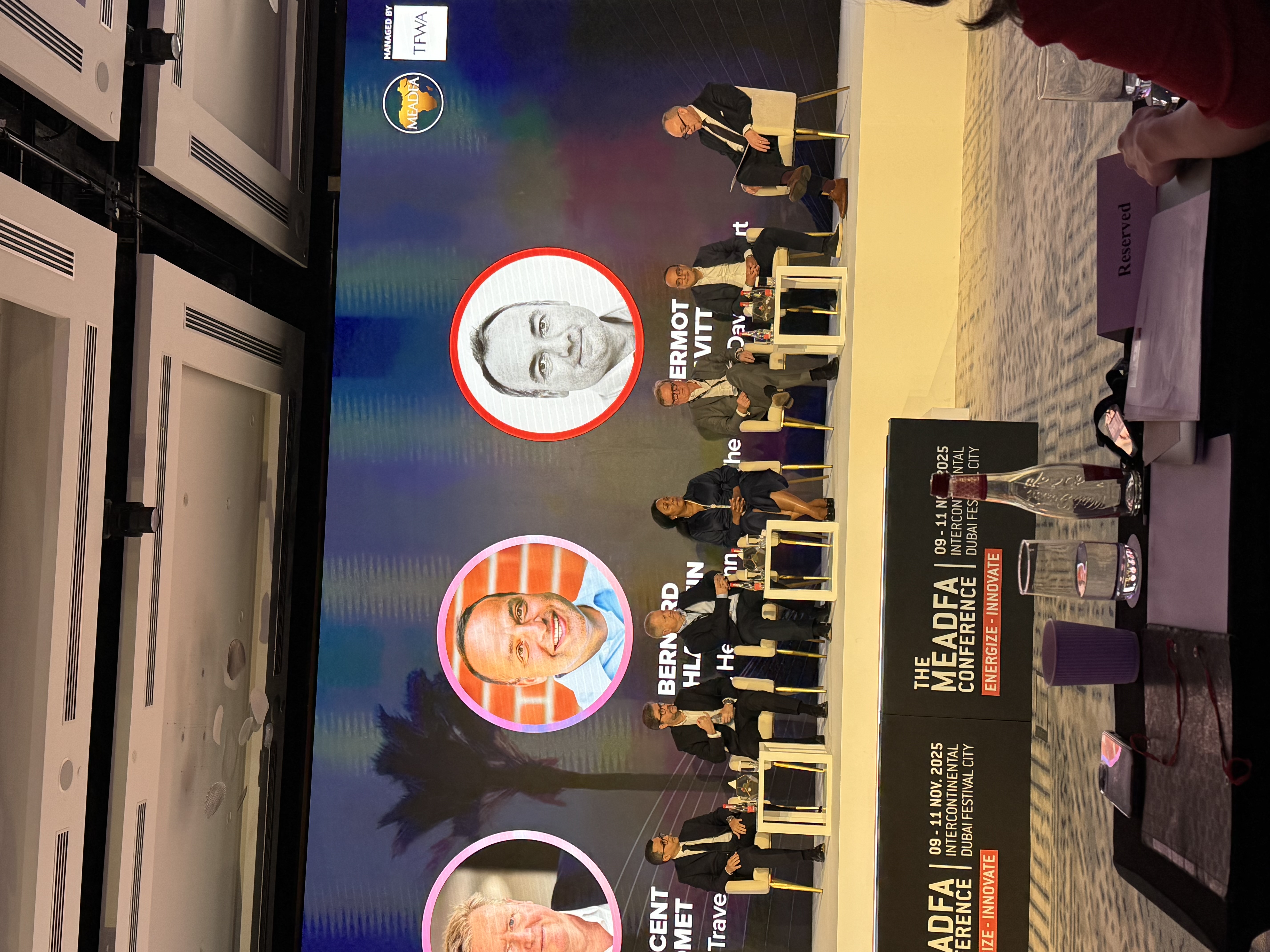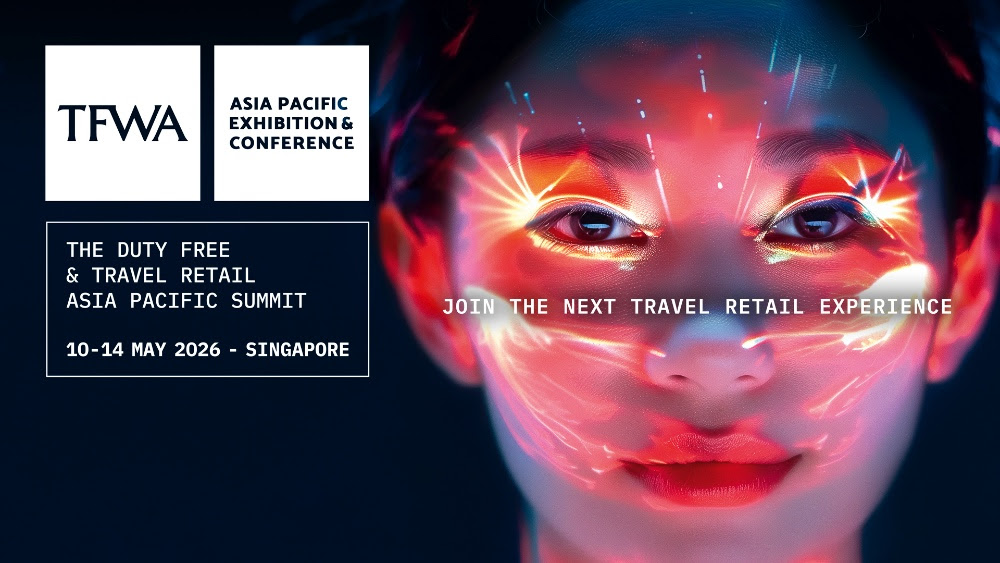November 11, 2025
Leaders from the MEADFA conference discuss ‘Leading Through Change’
Six industry leaders gathered on the opening morning of the 2025 MEADFA Conference in Dubai to dissect how travel retailers can maintain competitive advantage

Six industry leaders gathered on the opening morning of the 2025 MEADFA Conference in Dubai to dissect how travel retailers can maintain competitive advantage amid geopolitical volatility and shifting consumer expectations.
The “Leading Through Change” panel brought together Abdeslam Agzoul, CEO Middle East & Africa at Avolta, Nuno Amaral, CEO at Aer Rianta International, Chichi Maponya, Co-founder and Executive Chairperson of Africa Travel Retail, Jack MacGowan, CEO of Al Waha Duty Free Company, Vincent Romet, CEO France & Luxembourg and COO MEA & South East Asia & Africa at Lagardère Travel Retail and Bernard Schlafstein, CEO of Middle East & Africa at Gebr. Heinemann.
Dermot Davitt, President of The Moodie Davitt Report, moderated the discussion, which centered on rethinking value propositions for new generations of travelers.
Agzoul opened by framing volatility as catalyst rather than constraint. “Volatility, for us, is an opportunity,” he said. “We should not take volatility as a risk, but as an opportunity.”
The sentiment reflected broader themes about agility and flexibility that emerged throughout the 90-minute session.
Regional ambitions
ARI has operated in the Middle East for 35 years, recently celebrating success with its Abu Dhabi operation that opened two years ago. Amaral positioned the region as aligned with the retailer’s entrepreneurial spirit.
“The region reflects a little bit of ARI’s spirit in terms of entrepreneurship, taking risks and constantly trying to evolve,” Amaral said.
“We want to continue to grow. Our most recent opening two years ago in Abu Dhabi was really successful. We continue to look at opportunities in the region – we see a lot of potential and resilience,” he said.
Romet highlighted infrastructure investment supporting tourism growth across GCC countries, noting Lagardère’s commitment to regional ambitions.
“We see a lot of investment in tourism, backed by investment in infrastructure,” Romet said. “We see a lot going on in GCC countries and this is accelerating for sure. We, Lagardère, are here to serve those ambitions. To listen to those countries that have a bright vision for themselves.”
MacGowan made his first public forum appearance representing Al Waha, a subsidiary of PIF, the sovereign fund of Saudi Arabia. He outlined a service-focused approach aligned with Vision 2030 goals.
“PIF have set up Al Waha to compete and win business and transform the airport experience,” MacGowan said. “We will be different because we are so closely aligned with the customer service goals of Vision 2030. We desperately want to improve the tourist experience in the airports and other touchpoints. So how we compete is not going to be on price – it will be on service. Our core focus is about sales, staff, getting the assortment right and underpinning all of that is how deeply we understand our customers.”
Evolving travelers
Maponya characterized contemporary travelers as more discerning than traditional brand-conscious shoppers, seeking experiences centered on time, freedom and travel itself.
“The traveler is more astute. The traveler knows what they want,” Maponya said. “At the time of Covid, many people were all about self. The new rich don’t care about brands, the house you live in, the car… they want time, freedom and travel – and that element of travel is still there.”
She stressed that while passenger numbers have increased, conversion rates require attention through enhanced collaboration between airports, airlines and retailers.
“Collaboration with airports, airlines, because all of us are talking to this one traveler,” Maponya said. “How do we share data and information to make sure that we offer a value proposition to the traveler that enhances their journey and their experience?”
Maponya emphasized integrating authentic local brands into retail offerings.
“Culture is one of the biggest experiences we can present,” Maponya said. “Concessionaires need to be authentic in the way they engage local brands and make the supply chain process without compromising but make it more accessible to local brands.”
Schlafstein discussed Gebr. Heinemann’s experience at Jeddah Duty Free, where tobacco maintains strong performance alongside both traditional and niche beauty brands, including local offerings. The retailer targets up to 20% local product representation.
“We believe there will be drive towards more local brands,” Schlafstein said. “We already have a big chunk of our business – double-digit percentage of local SKUs we supply to Jeddah or get from Saudi to Jeddah.”
Gen Z demographics
MacGowan noted the significant Gen Z passenger demographic in Saudi Arabia, prompting questions about staff recruitment and customer understanding.
“We’ve got two-and-a-half-times the Gen Z passengers than the global average,” MacGowan said. “So the question I ask when we are recruiting our staff, is how many of the staff that are serving our Gen Z consumers are Gen Z themselves?”
Amaral identified engaging Gen Z and Gen Alpha as a medium-term challenge, noting these demographics acquire shopping intentions differently through online channels.
“They not only shop differently but acquire their intention to shop in a different way,” Amaral said. “Everything is done online – that is where they acquire their information.”
He discussed the balance between premium positioning and value communication.
“We used to be a very premium channel yet always shout about value and there was a little bit of a disconnect between what you see in our shops,” Amaral said. “I think all operators have tried different models of showing value and probably going a bit more hard selling. Initially there was a lot of resistance from brands and airports, even internally, but the proof is in the pudding and actually it works.”
Data and personalization
Agzoul emphasized that personalization and customer centricity should be operator obsessions, achievable through data utilization. Avolta is implementing culture ambassadors rather than brand ambassadors to promote sense of belonging and place.
“You can only achieve that by the data you use… if you use all the data you manage, and the smart use of this data,” Agzoul said.
“Apart from having product, pricing, etc… the people are key,” Agzoul said. “You have people that really represent and promote this sense of belonging, sense of place and sense of culture.”
MacGowan emphasized the need for data sharing between airports, airlines, operators and brands to compete with online channels.
“We now have a small group of large players and they are not always as fast, as agile or as accepting of the local conditions as could be – both on the brand and operator side and increasingly on the airport side,” MacGowan said. “Generally, we are consolidating into a more mature industry where there’s much larger players and the challenge is to be local so the first step in that is to invest in data sharing between airports, airlines, operators and brands – that’s really key to competing with the online channel.”
Premiumization versus value
Romet addressed the apparent tension between premiumization and price transparency, suggesting the two approaches complement rather than contradict each other.
“At Lagardère we have a very strong marketing team so we feel the way we have to combine those two things that may look opposite but in the end are the experience the young generation are looking for,” Romet said.
He noted a clear shift toward responsible consumption, linked to authenticity and shoppers understanding where products originate.
Amaral explained how contemporary consumers prioritize value and authenticity over aspirational lifestyle messaging.
Maponya stressed the importance of storytelling and authentic experiences for new travelers.
“Absolutely,” Maponya said when asked about a new promise to consumers. “I think we underplay the importance of the storytelling and the new traveler wanting authenticity in the products and not wanting repetition. Every trip is an experience, and they want to see it and feel it and that gives us an opportunity to engage at that level.”
The panel agreed that addressing younger generation preferences requires stakeholder collaboration and data sharing to anticipate trends and maintain competitive advantage against online channels.




